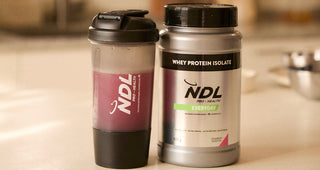Featured Products

Whey Protein Isolate
See product
Whey Protein Isolate Pure Vanilla Blis
See product
Whey Protein Isolate Strawberry Sensation
See productProtein shakes have become an essential ally for athletes, fitness enthusiasts, and people looking to optimize their daily nutrition. However, a common question arises: How much protein should you take?
In this post, we’ll help you understand how many protein shakes per day can be consumed without overdoing it approximately.
Why drink protein shakes?
Protein shakes are a very popular nutritional tool, especially among athletes, active people, and those looking to improve their body composition. These drinks are not only practical and easy to consume but also provide multiple health and physical performance benefits.
One of the main reasons to drink protein shakes is their ability to promote muscle recovery after exercise. During training, muscle fibers are damaged and need amino acids to repair and grow. Protein, especially in shake form, provides these nutrients quickly and efficiently.
Additionally, protein shakes are ideal for increasing daily protein intake, an essential macronutrient for maintaining muscle mass, strengthening the immune system, and supporting numerous bodily functions. This is especially useful for people with increased needs, such as athletes or older adults.
On the other hand, shakes can be perfect allies in weight loss processes, as they help maintain a feeling of satiety and reduce cravings while protecting muscle mass during a calorie deficit.
In short, consuming protein shakes is a simple and effective way to meet your nutritional requirements, improve physical performance, and care for your overall health. The key is to choose quality options and adapt them to your specific needs and goals.
But, how much protein should you consume daily? Keep reading.
How much protein does the body need daily?
The daily protein amount varies depending on factors such as age, body weight, physical activity level, and personal goals (e.g., gaining muscle or losing weight). As a general reference:
- Sedentary people: need approximately 0.8 grams of protein per kilogram of body weight per day.
- Active people or athletes: may require between 1.2 and 2 grams of protein per kilogram of body weight, depending on the intensity of their physical activity.
- People looking to gain muscle mass: are recommended to consume between 1.6 and 2.2 grams per kilogram of body weight.
- Older adults: need a slightly higher intake (around 1 to 1.2 grams per kilogram) to prevent muscle mass loss with age.
For example, a person weighing 70 kg with a moderately active lifestyle should consume between 84 and 140 grams of protein per day.
It is important to note that not all protein should come from supplements. A balanced diet that includes high-quality protein sources, such as lean meats, fish, eggs, dairy, legumes, nuts, and supplements like protein shakes if an extra boost is needed, should be prioritized.

Factors influencing the recommended number of shakes
The number of protein shakes a person should consume daily is not universal, as it depends on several individual factors. Below are the most important ones:
-
Personal goals: shake consumption varies depending on what you want to achieve:
- Muscle gain: if your goal is to gain muscle, you will need an extra protein intake to complement your diet. Shakes can help meet your requirements.
- Weight loss: during weight loss, protein shakes can help maintain muscle mass and increase satiety.
- Recovery and sports performance: shakes are ideal for speeding up recovery after intense training sessions and improving physical performance.
- Daily diet: Your regular diet is key in determining how many shakes you need. If you consume enough protein from natural sources like meat, fish, eggs, dairy, and legumes, you might need fewer shakes. However, if your diet lacks protein, shakes become a practical and effective supplement.
-
Type of training: The intensity and duration of exercise directly influence your protein needs:
- Strength training: it requires a higher protein intake to repair and build muscle. For example, an 80 kg athlete requires between 128 and 160 grams of protein. If his diet provides 100 grams of protein, a 30-gram shake would make up the difference, without the need to overdo it.
- Endurance training (e.g., running or cycling): it also increases protein needs, but to a lesser extent than strength. For a 70 kg person you would need 84-112 grams per day. If your diet covers almost all of this amount, a single post-workout shake may be sufficient to support muscle recovery.
- Moderate or light workouts: in these cases, protein requirements are lower, and additional shakes may not be necessary.
- Body weight and composition: Protein needs increase proportionally with body weight. Larger individuals, especially those with higher muscle mass, require more protein to manrain and repair his/her tissues. In general, 1.2 to 2 grams of protein per kilogram of weight is recommended for active people.
Based on this, the number of recommended protein shakes depends on your goals, daily diet, training routine, and body weight. Ideally, they should be used as a supplement, not a substitute for a balanced diet, ensuring that your consumption is aligned with your specific needs to maximize benefits without excess.
Why not overdo protein shakes?
Excessive consumption of protein shakes may be unnecessary if you're already meeting your requirements through diet. The body has a limit to how much protein it can effectively use, and consuming excess does not offer additional benefits.In addition, abusing smoothies can displace other sources of important nutrients found in natural foods.
How to distribute protein throughout the day?
A proper distribution of protein intake is key to maximizing absorption and ensuring the body has nutrients available throughout the day. Instead of consuming large amounts of protein in a single meal, it is more effective to spread it over breakfasts, main meals, dinners and post-workout snacks.
It is important to distribute protein because the body cannot store large amounts of protein as it does with fats or carbohydrates. Therefore, distribute its intake in a balanced way throughout the day promotes muscle protein synthesis, especially in active people or athletes, muscle recovery after training and greater satiety during the day, what can be beneficial in weight loss processes.
For someone needing 120 grams of protein daily, an ideal An example of a protein distribution for a person who needs 120 grams of protein per day (e.g., someone weighing 75 kg with moderate physical activity), this could be an ideal distribution:
- Breakfast (20-25 g of protein): 2 whole eggs, 1 egg white (14 g), 200 ml Greek yogurt (10 g) and like an option: a small portion of oatmeal with dried fruits and nuts.
- Post-workout snack (20-30 g): 1 whey protein shake with milk or water.
- Lunch (30-35 g): 150 g grilled chicken breast (35 g of protein) with quinoa and vegetables.
- Afternoon snack (10-15 g): 30 g nuts (5 g of protein) and 100 g cottage cheese (10 g of protein).
- Dinner (25-30 g): 200 g salmon or white fish (30 g of protein) with steamed vegetables and a small portion of potato or brown rice.
In short, distributing the protein throughout the day in several doses optimizes its use by the body, promotes muscle recovery and provides satiety. Combining natural foods and protein shakes is the best way to meet your daily needs and balance your diet. Adjusting your consumption to your specific needs will help you get all of your benefits safely and effectively.

From the NDL Pro-Health team we will provide you with tips to maintain a healthy lifestyle. Sharing knowledge and product recommendations to offer optimal solutions for your daily routine, for your workouts and subsequent recovery, all with the goal of helping you achieve physical and mental wellness.

















